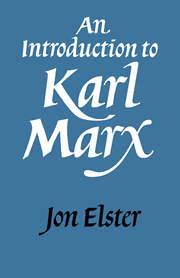Book contents
7 - Class Consciousness and Class Struggle
Published online by Cambridge University Press: 05 January 2012
Summary
INTRODUCTION
It is a truism that people have an interest in improving their situation. The strategies available to them are by individual and collective betterment. Let us focus on the respects in which their situation can only be collectively improved by the creation of public goods that are out of reach of individual effort. In any society there are organized groups trying to promote the interests, broadly conceived, of their members. There will also be many individuals who have strongly felt interests in some public good or collective action but for various reasons are unable to join forces with other people with similar interests. Finally, there will be some individuals who, objectively, would seem to have a strong interest in some public good, although, subjectively, they do not experience it that way.
Of these, the second group of people form an unstable category. If they are unable to rise into the first, they will tend to sink down to the third. In the long run, it is psychologically difficult to maintain a strong desire for something that manifestly is out of reach. The tension is usually resolved by reducing one's level of aspirations and adjusting one's set of values so as to give less importance to those that cannot be realized anyway. Occasionally it is also resolved by adjusting one's beliefs so as to be able to think it possible to get what one wants, but this solution is inherently less stable.
- Type
- Chapter
- Information
- An Introduction to Karl Marx , pp. 122 - 140Publisher: Cambridge University PressPrint publication year: 1986



